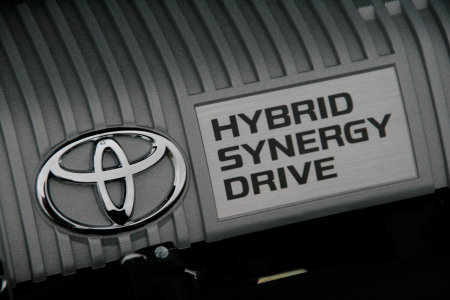Toyota Working To Cut Costs, Establish A Hybrid Standard
Jason Lancaster | Jul 22, 2009 | Comments 6
Since the very first Toyota Prius went on sale in the USA back in 2001, Toyota has been working carefully to establish their hybrid synergy drive as the de facto hybrid standard. Ford and Nissan licensed certain aspects of Toyota’s hybrid systems in 2004 and 2006 respectively, and just last week it was reported that Mazda will begin licensing Toyota’s hybrid technology in the near future.

Toyota works to create a hybrid design standard and cut costs.
It’s also been rumored that Toyota has discussed hybrid technology licensing deals with Subaru and GM. Generally, these moves are viewed with skepticism. On one side, some Toyota fans object to sharing technology. On the other side, jealous auto manufacturers (and their fans) view Toyota’s offer to share as arrogant greed. However, the real reason that Toyota is looking to license their hybrid technology is to cut costs by creating a standard.
Toyota holds more than 2,100 hybrid patents that have been developed over the last 12 years. These patents entitle Toyota to a legal monopoly for the technology they have created, which allows them to a) sell the right to use the technology and b) sue if and when someone uses their technology without paying. Toyota’s patents are so “air tight” that some experts say they’re purposefully blocking competitors from developing competing hybrid technology. While that may be true, it’s arguable that their intent is malicious.
After all, Toyota made a significant investment in this technology and took on substantial risk. If the technology wasn’t marketable, Toyota would lose billions. Toyota’s investment – and their ingenuity – legally entitles them to profits. Licensing patents is a way for Toyota to recover their initial investment and return profits to their investors.
But licensing isn’t just about money. In 2004, when Toyota licensed certain aspects of their hybrid system to Ford, it was done without money changing hands. Just recently, when Toyota discussed offering hybrid technology to GM following bankruptcy, it’s hard to imagine that Toyota envisioned a major influx of cash from the recovering automaker. While Toyota is definitely out to make a profit, their licensing activities are about more than cash.
By offering to license their hybrid system to competitors, Toyota accomplishes three goals:
- Toyota increases economies of scale with critical hybrid components. When Toyota licenses their system to a competitor, that entitles the competitor to buy certain hybrid components from suppliers. As suppliers make and sell more parts, costs drop, resulting in lower costs for everyone.
- As competitors use Toyota’s designs, Toyota establishes some design standards. At this early stage in hybrid technology, every aspect of hybrid system design is open to change. As competitors use Toyota’s system they will adopt some basic standards for simple items like system voltage, types of sensors, etc. This helps reduce costs for the future – more similarities in components makes production cheaper.
- Consumers become accustomed to the functional aspects of Toyota’s system. Rival designs can function differently in the consumer’s eyes, potentially leading to a situation where consumers might prefer a hybrid system that’s fundamentally different than Toyota’s design. By licensing their system early, they establish a baseline with consumers.
In other words, there’s more to licensing hybrid technology than just short-term financial gain. Toyota is looking to create a fundamental standard for hybrids for the future. Standards in design lead to greater economies of scale. Standards also reduce wasted investments by competitors bent on creating an unnecessary alternative standard. By establishing a standard now, everyone benefits.
As usual, Toyota is planning for the future – that’s why they’re number one.
Filed Under: Auto News


Now if only Toyota can develop a tundra hybrid that gets 25 or more avg. mpg and still achieves over 300 hp and 330 lb. of torque costing 3K or less to buy the upgraded hybrid tundra. Bring it on, the world is ready for it. I can dream, so might as well dream big. I don’t forsee it happening in my lifetime, but I wish it would.
Ditto to MK!
mk – Word.
Toyota should put the Volta into full production so Chevy can stick their Volt where the sun don’t shine.
Why would GM stick the Volt in Spokane, Washington? Are they having some sort of fuel crisis due to solar energy lack? I AM SO CONFUSED!!!!
and a touch evil.
Jeremy – LOL! Very funny.